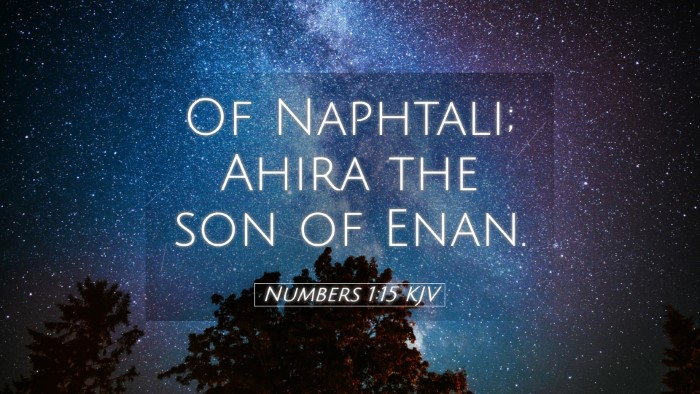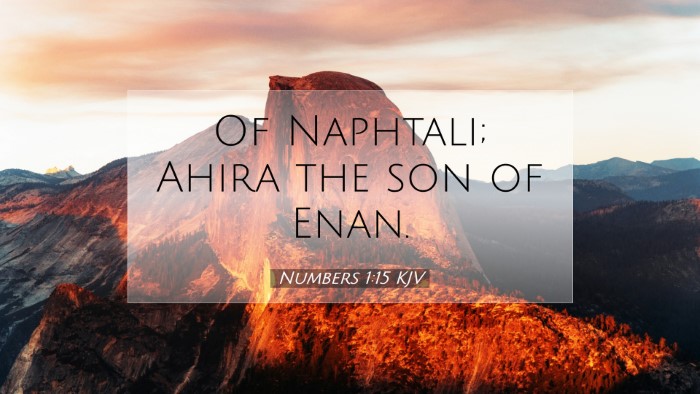Commentary on Numbers 1:15
Verse: "And of the tribe of Gad; Eliasaph the son of Deuel." (Numbers 1:15)
Contextual Overview
The Book of Numbers records the experiences of the Israelites in the wilderness and provides a detailed account of their journey from Sinai to the Promised Land. Numbers 1 begins with a census of the Israelites, where God commands Moses to take a count of the congregation and organize them by tribes. This count was essential for military organization and preparation for entering the Promised Land.
Commentary Insights
- Matthew Henry:
Henry emphasizes the significance of names and lineage in this census, tracing each tribe's leader and their respective families. The mention of Eliasaph, emphasizes God's order and divine selection in leadership. Leaders like Eliasaph represent the commitment of their tribes to God’s covenant.
- Albert Barnes:
Barnes highlights that the tribe of Gad, represented by Eliasaph, showcases a group of people who were known for their valor and fierce warriors. The significance of the tribal leaders selected is not just a mere formality; it implies a divine appointment and shows how God engages in the lives of His chosen people. Furthermore, the name 'Gad' is linked to fortune and signifies the strength of the tribe.
- Adam Clarke:
Clarke focuses on the specific name of Eliasaph and the historical lineage he represents. He notes that the details of genealogy serve to remind the Israelites of their heritage and the promises God has made to their forebears. It fortifies the identity of each tribe while also reminding them of their responsibilities towards God. Clarke mentions that Deuel (also known as Reuel) is an example of a family from which leadership arises.
Theological Implications
This verse not only identifies a lineage but signifies God’s providence in Israel's history. The verse emphasizes three crucial theological pillars:
- Divine Order:
The choice of leaders like Eliasaph illustrates God's authoritative structure in Israelite society. It was essential for maintaining order and direction as they navigated wilderness challenges.
- Covenant Community:
This census acts as a reminder of the covenant God made with Abraham, Isaac, and Jacob, reinforcing the identity and unity among the tribes as God’s chosen people.
- Leadership Responsibility:
With the mention of a specific leader, the community is reminded of the accountability placed on those in authority. Leaders must uphold the standards set by God and guide the people according to His will.
Practical Applications for Ministry
The passage encourages modern pastors and leaders to consider the implications of leadership within their communities:
- Selection of Leaders:
Leaders in the church should embody spiritual integrity and serve as models of faith, reflecting God’s character in their governance.
- Understanding Heritage:
Church communities should foster awareness of their spiritual heritage. Teaching about lineage and theological history strengthens the faith of congregants.
- Maintaining Order:
Leadership should aspire to create a structured community founded on biblical principles, emulating the orderly nature of God's design as seen in Israel.
Conclusion
The mention of Eliasaph in Numbers 1:15 is more than a genealogical note; it serves as an important reminder of God's intentional design in leadership and community formation. The historical and theological lessons extracted from such verses enrich our understanding and application of Scripture today, keeping us aligned with God's ultimate purpose for His people.


